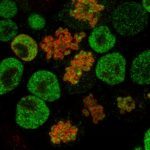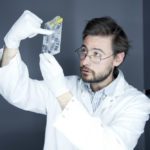Link to Pubmed [PMID] – 34397088
Link to DOI – 10.1242/dev.199604
Development 2021 Aug; ():
The maintenance of pluripotency in mouse embryonic stem cells (ESCs) is governed by the action of an interconnected network of transcription factors. Among them, only Oct4 and Sox2 have been shown to be strictly required for the self-renewal of ESCs and pluripotency, particularly in culture conditions where differentiation cues are chemically inhibited. Here, we report that the conjunct activity of two orphan nuclear receptors, Esrrb and Nr5a2, parallels the importance of that of Oct4 and Sox2 in naïve ESCs. By occupying a large common set of regulatory elements, these two factors control the binding of Oct4, Sox2 and Nanog to DNA. Consequently, in their absence the pluripotency network collapses and the transcriptome is substantially deregulated, leading to the differentiation of ESCs. Altogether, this work identifies orphan nuclear receptors, previously thought to be performing supportive functions, as a new set of core regulators of naïve pluripotency.




